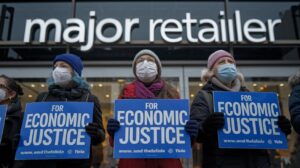Public Media CEOs Defend Federal Funding Amid Congressional Scrutiny
Public media leaders are pushing back against congressional scrutiny over federal funding, arguing that NPR and PBS play a crucial role in delivering unbiased news and educational content to American communities. In a heated congressional hearing, NPR CEO Katherine Maher and PBS CEO Paula Kerger defended their organizations from accusations of bias and wasteful spending.
Congressional Hearing on Public Media Funding: What’s at Stake?
The recent congressional hearing focused on whether NPR and PBS should continue receiving federal funding. The “Anti-American Airwaves” subcommittee, led by Rep. Marjorie Taylor Greene, questioned whether taxpayer money should support public broadcasting. Critics argue that with the rise of digital media, public broadcasting has become outdated. On the other hand, supporters stress that NPR and PBS provide valuable news, educational programs, and local reporting that private media often neglects.
Key Issues Discussed in the Hearing:
| Issue | Critics’ Argument | Supporters’ Argument |
|---|---|---|
| Government Funding | Taxpayer money should not fund media organizations. | Funding ensures rural communities have access to news and education. |
| Media Bias | NPR and PBS have a left-leaning bias. | Public media offers nonpartisan, fact-based journalism. |
| Relevance in Digital Age | Online news and streaming services make public media unnecessary. | Many Americans, especially in rural areas, rely on NPR and PBS. |
Public Media’s Accountability and Past Mistakes
One of the most debated topics in the hearing was NPR’s handling of the Hunter Biden laptop story. NPR CEO Katherine Maher admitted that the organization should have reported on the story earlier and more aggressively. This acknowledgment was an attempt to reassure lawmakers and the public that NPR is committed to improving its journalistic integrity.
Despite this admission, Maher emphasized that NPR remains a trusted news source and that its editorial decisions are based on facts rather than political biases.
What NPR and PBS Are Doing to Improve:
- Increased transparency in reporting decisions.
- Stronger editorial oversight to ensure balanced coverage.
- Expanding rural coverage to provide more local news.
Why Public Media Funding Matters: The Bigger Picture
PBS CEO Paula Kerger defended the necessity of public media, highlighting its impact on education and news dissemination. She argued that cutting public broadcasting funding would disproportionately harm rural communities that rely on NPR and PBS for educational content and local news.
Public Media’s Reach and Influence:
- 120 million people engage with PBS each month.
- NPR reaches over 57 million Americans through radio and digital platforms.
- PBS Kids programs are used by over 14 million children, providing high-quality early childhood education.
The Role of Federal Funding: Breaking It Down
The Corporation for Public Broadcasting (CPB) provides funding for NPR and PBS. Many local stations depend on this federal support to operate.
If Congress eliminates this funding, many small stations could shut down, cutting off millions of Americans from educational and emergency information.
The Future of Public Broadcasting in the U.S.
The debate over public media funding isn’t just about politics—it’s about maintaining a trusted source of news and education. While some argue that NPR and PBS should survive on private funding alone, their role in serving underrepresented communities remains undeniable.
A 2024 survey showed that:
- 72% of Americans trust PBS for news and public affairs programming.
- 64% of Americans trust NPR.
- Rural stations would lose critical access to educational and emergency broadcasting if funding is cut.
Public media plays a vital role in American democracy, providing factual information and educational programming that commercial networks often overlook.
Conclusion: Will Public Media Survive Without Federal Funding?
The fight over federal funding for public media is far from over. If lawmakers decide to cut funding, NPR and PBS may need to rely solely on private donations, sponsorships, and grants. However, the loss of federal support would disproportionately affect rural communities and low-income families that depend on public broadcasting for educational and emergency content.
The debate continues, but one thing is certain—public media remains a critical resource for millions of Americans.





